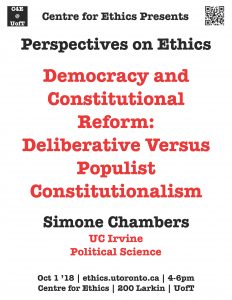
Democracy and Constitutional Reform: Deliberative Versus Populist Constitutionalism
Whereas, populism has sometimes been thought to be a movement that attempts to bypass, discredit, or suspend constitutions, contemporary populism has often progressed and gained ground through embracing and claiming ownership over national constitutions and the “people.” The cases that I look at are Hungary, Poland, Turkey and Venezuela but the threat is quite broad.
Populist constitutionalism poses a problem for scholars and citizens alike who believe that constitutional politics should also be democratic politics. How do we tell the difference between democratically driven constitutionalism and populist constitutionalism? How can citizens participate in constitution-making without hijacking constitutionalism for majoritarian, nationalist, and authoritarian ends?
One of the challenges in identifying normative objections to populist constitutionalism is how to hold on to essential ideas of popular sovereignty and citizen participation without surrendering constitution-making and constitutional limits to the anti-pluralist forces of populism. Deliberative constitutionalism, because it invests popular sovereignty in processes of collective egalitarian discourse rather than in outcomes of majoritarian procedures or an identifiable general will is in a good position to offer a critical yard stick for questioning the democratic credentials (not just liberal) of populist constitutionalism.
In this paper I lay out the main features of populist constitutionalism and then contrast it with three alternatives: liberal constitutionalism, popular constitutionalism, and deliberative constitutionalism. I argue that only deliberative constitutionalism offers a model of constitutional reform that includes citizens but offers practical advice for excluding or mitigating populist forces. The use of referendums in Scotland and Ireland are used as illustrations of deliberate appeals to citizens in constitutional questions.
☛ please register here
Simone Chambers
UC Irvine
Political Science
Mon, Oct 1, 2018
04:00 PM - 06:00 PM
Centre for Ethics, University of Toronto
200 Larkin
